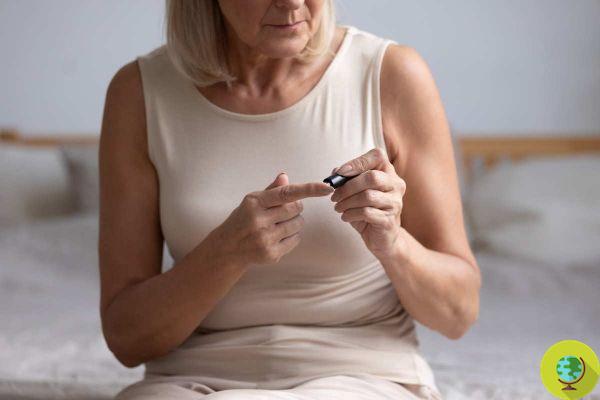
Diabetic patients have a common feature: they tend to wake up at the same time every night. Let's find out why
Don't store avocado like this: it's dangerousDiabetic patients have a common feature: they tend to wake up at the same time every night. Let's find out why
Most diabetic patients wake up almost every night at the same time, around 3 a.m., but not from some annoying noise that interrupts their sleep, but because of the sudden spike in blood sugar levels.
This phenomenon can happen for two reasons: theSomogyi effect or phenomenon of dawn. (Read also: Type 2 diabetes: four peculiar signs in the mouth, possible symptoms of high blood sugar)
Index
The phenomenon of dawn
As we know, our bodies use glucose for energy, and to wake up in the morning you need a little extra energy. Then, the body starts using the stored glucose to prepare for the next day. At the same time, the liver releases extra glucose into the blood due to the growth hormone, del cortisol and catecholamine. This generally happens in the morning around 2:00 to 3:00 to prepare the body to get up and face the day.
For a person with diabetes, as these events occur, the drug doses taken one day earlier begin to wear off; the result? All these phenomena together lead to a increased blood sugar level right in the morning.
The Somogyi effect
The second cause of high blood sugar in the morning is due toSomogyi effect, also called rebound hyperglycemia. This happens when the blood sugar level drops too low in the middle of the night and the body releases hormones, which force the liver to release stored glucose in order to stabilize the amount in the body. But in the case of the diabetes, the liver releases extra glucose which causes high blood sugar in the morning.
What is the difference
The main difference between the two is that the Somogyi effect leads tohypoglycemia, followed by hyperglycemia. One of the easiest ways to find out if the spike in blood sugar is due to the Somogyi effect is to check your sugar levels before bed and right after waking up. If this is low during the night it is due to the Somogyi effect; while, if it is normal or high it may be due to the phenomenon of dawn.
Another point to keep in mind is that the Somogyi effect can occur at any time of the day when there is a high blood sugar level in your body.
How to check your sugar level in the morning
Once you are sure what is causing your blood sugar spike, you need to take steps to check your health. We always advise you to contact your primary care physician and evaluate the situation together; there are two ways of intervening depending on whether it is the dawn phenomenon or the Somogyi effect. (Read also: Diabetes: The shorter people most at risk of developing it. A study reveals why)
For the phenomenon of dawn it is necessary:
- change the timing or type of diabetes medications
- have a lighter breakfast (Read also: Diabetic breakfast, eat with gusto while keeping blood sugar low)
- increase the morning dose of drugs
For the Somogyi effect, however, it is necessary to:
- decrease the dose of diabetes medications at night
- add a carbohydrate-laden snack before bed
- change the training program
Follow us on Telegram | Instagram | Facebook | TikTok | Youtube
Could it be interesting for you:
- Thus "smart" insulin could greatly improve the treatment of type 1 diabetes
- Diabetes, the pill arrives: created the first injection of insulin that you swallow
- Diabetes: soon insulin pills instead of injections
- Diabetes: from MIT insulin that is activated only if needed
- Diabetes: goodbye finger pricks! Here comes the patch that measures glucose levels
- Diabetes: Introducing these two little-used grains into your diet prevents type 2 diabetes and reduces the risk of getting sick
- Feet first spies of diabetes: the signals on the fingers that warn of high blood sugar levels
- Endocrine disruptors: They are an (underestimated) risk factor for diabetes. I study
- Diabetes: 10 myths about nutrition for diabetics to dispel


























